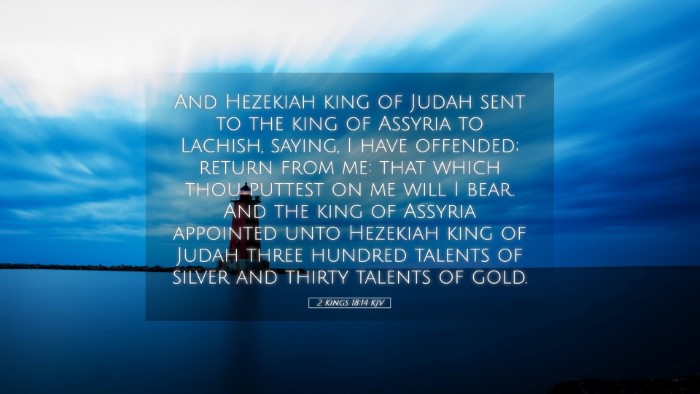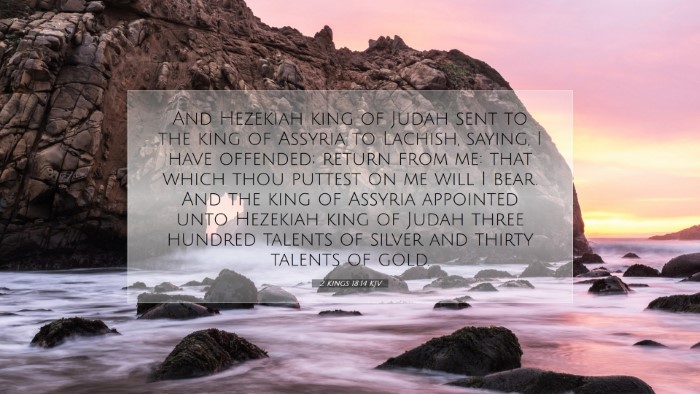Commentary on 2 Kings 18:14
Verse: 2 Kings 18:14 - "And Hezekiah king of Judah sent to the king of Assyria to Lachish, saying, 'I have offended; return from me: that which thou puttest on me will I bear.' And the king of Assyria appointed unto Hezekiah king of Judah three hundred talents of silver and thirty talents of gold."
Contextual Background
This verse occurs during a pivotal moment in the history of Judah. Hezekiah is faced with the daunting challenge of the Assyrian threat, which recently devastated the Northern Kingdom of Israel. Under his reign, Judah had experienced a religious revival and reforms, yet external pressures from powerful empires posed significant challenges to the kingdom's stability.
Verse Analysis
The exchange between Hezekiah and the king of Assyria reflects a complex interplay of diplomacy, surrender, and the recognition of vulnerability. This situation is characterized not only by geopolitical realities but also by the theological implications of trust in Yahweh amid overwhelming odds.
Hezekiah's Response
Hezekiah's words, "I have offended; return from me," indicate his willingness to negotiate under desperate circumstances. Historical context reveals that Hezekiah was known for his faithfulness to God, yet here he appears to compromise. This moment raises questions about the human tendency toward pragmatism in crisis situations.
Public Domain Commentary Insights
Matthew Henry
Matthew Henry notes that Hezekiah’s acknowledgment of wrongdoing hints at his humility and desire to preserve his kingdom. Unlike some kings before him, who displayed arrogance or defiance, Hezekiah demonstrates a propensity to seek peace even at the cost of financial tribute. Henry emphasizes the significance of Hezekiah’s recognition of his situation, juxtaposing it with the idolatry present in Israel's downfall.
Albert Barnes
Albert Barnes elaborates on the significant sum of tribute demanded by the Assyrians. The 300 talents of silver and 30 talents of gold denote a staggering amount, revealing the economic strain under which Judah operated. Barnes suggests that Hezekiah's decision reflects both a political maneuver and a theological dilemma—balancing trust in God with the pragmatic actions required for survival.
Adam Clarke
Adam Clarke further expounds that this moment illustrates the desperation of Hezekiah as well as the political realities of the time. Clarke discusses how this tribute could be seen as a lack of faith in God’s promise, raising the tension between divine reliance and human action. He brings attention to the potential for deeper consequences, not just politically but spiritually, as Hezekiah navigates this precarious situation.
Theological Implications
This passage provides profound insights into themes of humility, submission, and faith amidst adversity. It challenges readers to consider the balance between divine sovereignty and human responsibility.
Humility in Crisis
Hezekiah's humility serves as an essential lesson for leaders in positions of influence. The ability to admit fault and seek peace rather than engage in hostility can be more reflective of true strength than blind defiance.
Faith versus Pragmatism
Furthermore, the delicate balance between faith in God and the pressing need for practical solutions continues to resonate with contemporary leaders and congregations. Should reliance on divine providence encourage passivity, or does it urge proactive engagement with worldly challenges? The text encourages reflection on what it means to trust God while still navigating the complexities of earthly governance and societal pressures.
Application for Modern Believers
Pastors and scholars can draw rich applications from Hezekiah's response to crisis. The commitment to faithfulness, presence in the world, and acknowledgment of human limitations amid divine sovereignty provides powerful narrative elements that each believer can relate to in various life situations.
Leadership Lessons
- The importance of humility: Leaders should possess the wisdom to recognize their limitations and seek help when necessary.
- Discernment in Crisis: While it is crucial to trust in God, leaders must also carefully navigate the demands of their situations.
- Accountability: Hezekiah's willingness to acknowledge his mistakes can encourage a culture of accountability within churches and organizations.
Conclusion
2 Kings 18:14 reveals a complex scenario that serves as a microcosm for the challenges faced by leaders and believers alike. Through the lens of public domain commentaries, we see Hezekiah's response as a reflection of humility, faith, and the struggles inherent in human governance. The lessons derived from this verse continue to possess relevance, urging modern readers to navigate their faith in the context of societal challenges while anchoring their hope in God’s ultimate sovereignty.


